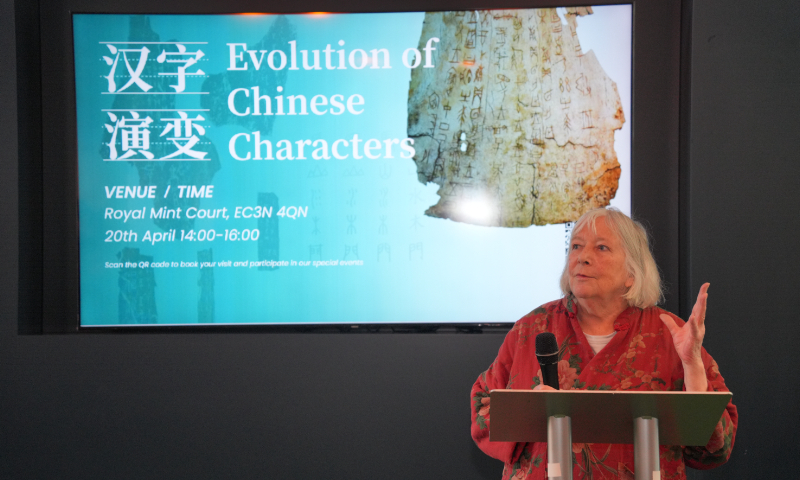ARTS / CULTURE & LEISURE
Journey through time: exhibition about evolution of Chinese characters opens in London

Dr Frances Wood, a well-known British sinologist, gives a speech on the launch event. Photo: Courtesy of the exhibition organizers
The "Evolution of Chinese Characters" exhibition and a series of events were launched in London during the weekend, celebrating the 15th United Nations Chinese Language Day which falls on April 20.
Organized by the Chinese Embassy in the UK, in collaboration with Art and Design Press, National Museum of Chinese Writing, School of Foreign Languages, Tongji University, and the Beijing International Chinese College, this ten-day exhibition aims to showcase the rich history and cultural significance of Chinese characters.
Minister Yang Xiaoguang from the Chinese Embassy in the UK, said that Chinese characters are among the oldest writing systems in the world. Having evolved and developed over thousands of years, Chinese characters bear witness to the origin of Chinese civilization, document the changes in Chinese history, and facilitate cultural exchanges between China and the rest of the world.
Chinese characters have long been integral to the preservation and evolution of Chinese cultural traditions, with their origins dating back to the Xia Dynasty (Approximately 2070 BC to 1600 BC). The discovery of oracle bone inscriptions in the Yin ruins of Anyang, China, provided early glimpses into the development of written language during the Shang Dynasty (Approximately 1600 BC to 1046 BC).
Dr Frances Wood, a well-known British sinologist, mentioned in her speech that Chinese characters have played an extremely important role in the inheritance and development of Chinese history and culture. She specifically mentioned a replica of a page from the Diamond Sutra, which is the world's first printed book with a confirmed date of 868 AD, currently housed in the British Library. The exhibition also showcases the different styles of Song and Tang Dynasty Chinese characters through woodblock printing. She hoped that more British audiences would visit the exhibition to understand this ancient and fascinating technology.
Throughout the exhibition, visitors have the opportunity to engage in a series of special events. These include a lecture on Eastern and Western culture by Professor Wu Yun, a seal cutting experience guided by a professional from the China National Academy of Painting, a discussion on diverse writing systems in China led by Dr Cheng Xunchang from the University of Reading, and a talk on traditional Chinese medicine and culture by Ke Songxuan, Director of the Asante Academy of Chinese Medicine. Through the exploration of Chinese characters, visitors can gain valuable insights into the profound history and inclusivity of modern-day China.
